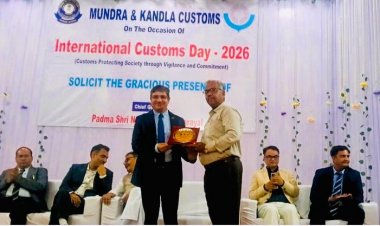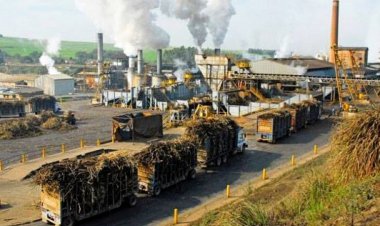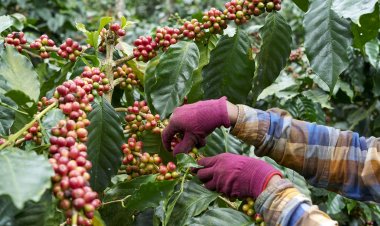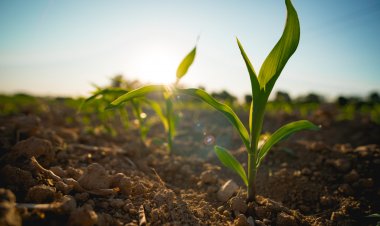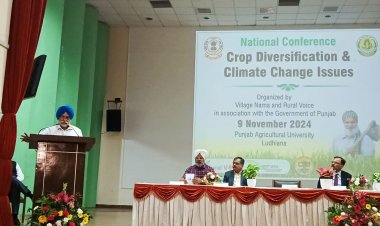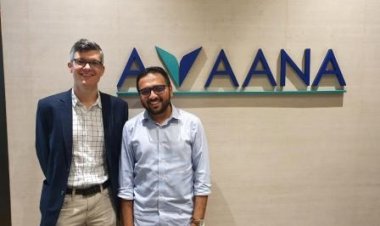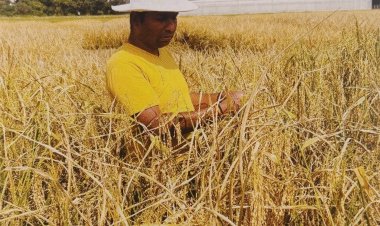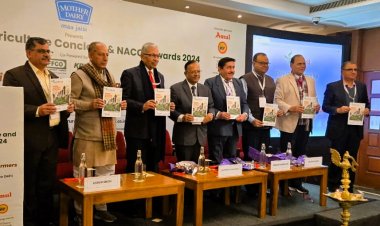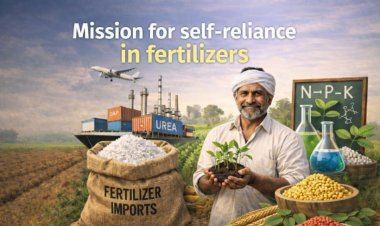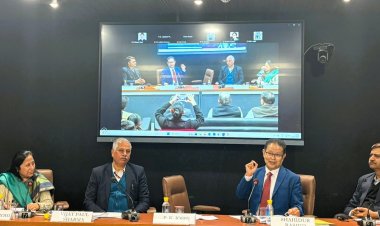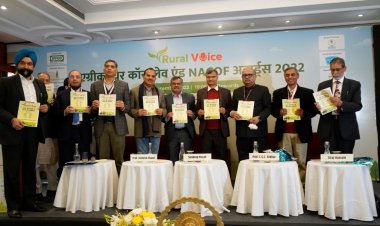Dairy startup Akshayakalpa Organic aims to achieve Rs 400 crores revenue this fiscal
After a successful 17-year stint in the technology sector and earning advanced degrees in computer science and telecommunications, Shashi returned to his roots with a vision to revitalise the farm sector. In 2010, he co-founded Akshayakalpa Organic with a mission to provide sustainable livelihoods through dairy farming.
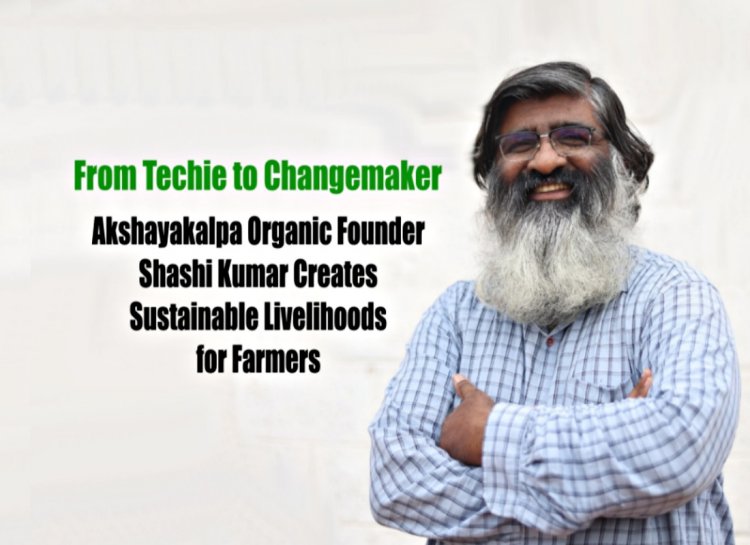
In a remarkable career shift from the tech world to the heart of rural India, Akshayakalpa founder, Shashi Kumar, is transforming the agricultural landscape and uplifting the lives of small-scale farmers. After a successful 17-year stint in the technology sector and earning advanced degrees in computer science and telecommunications, Shashi returned to his roots with a vision to revitalise the farm sector. In 2010, he co-founded Akshayakalpa Organic with a mission to provide sustainable livelihoods through dairy farming. In conversation with Harvir Singh, Editor-in-Chief of Rural Voice, Shashi revealed that Akshayakalpa’s innovative approach has since supported over 1,200 farmers across Karnataka, Tamil Nadu, and Telangana, integrating dairy farming with soil health initiatives to ensure a stable income for farmers. The company’s emphasis on organic practices and value-added dairy products has helped rejuvenate local agriculture, fostering financial stability and environmental sustainability. He aims to achieve a turnover of Rs 400 crore in 2024-25, up from 286 crore last year. Excerpts:
What is the thought behind starting the Akshayakalpa?
I pursued a bachelor's degree in computer science and subsequently began my career at Wipro Technologies. Later, I completed a master’s degree in telecommunication engineering from the Illinois Institute of Technology in Chicago. After spending 17 years in the technology industry, I decided to return to my homeland with a single goal: to rethink and recreate the country’s farm sector in a way that would improve the economic conditions of millions of small and marginal farmers.
Growing up, I was a classic example of how parents often don't want their children to go into farming. Being born into a farming family, my father, like many others, never wanted me to become a farmer. The aspiration was always for me to study well, leave farming behind, and secure a good job. However, after years in the technology field, I felt a strong pull to return to my roots and make a difference in the agricultural sector, which led to the founding of Akshayakalpa.
How did you get into the agriculture and allied sector from an IT company?
I come from the outskirts of Bangalore, Karnataka, near the border with Tamil Nadu. The place is called Attibele, and it's where I was born and raised. My parents are still farmers there. For a while, we had informal discussions with around 27 people from Wipro, talking about how farming needs to change. It started as a casual conversation, like a coffee table talk, but it gradually became more serious.
In 2010, we decided to take action. The 27 of us pooled our money together and started what was essentially a crowdfunded initiative. We launched an NGO to go back to rural areas, particularly focusing on villages where there are women and children in need of support. Many of these people have small plots of land - one acre, two acres, or even less - where traditional farming isn't viable. Our idea was to help them set up farming enterprises, giving them the support they needed to make a sustainable living from agriculture. That was the vision behind it all.
In our first year, we ran operations with a focus on bringing around 25 women together at a central location to work with them. However, over time, we realized that these women needed different kinds of support. They weren’t necessarily looking to become entrepreneurs. Instead, many of them required psychological and physiological support, as they had gone through very challenging experiences in their lives.
Initially, our idea was to work exclusively with women, but we soon reconsidered and decided to expand our efforts to include entire farming families. This shift in focus led us to recognize that a significant amount of funding would be necessary to make a meaningful impact. As a result, we began exploring the idea of establishing a private limited company, which ultimately led to the founding of Akshayakalpa in 2010.
Then we began to delve deeper into farming, meeting with farmers and their families. During this process, we noticed a troubling trend: many people were leaving farming, much like I had done earlier. Despite owning farmland, they were moving away from agriculture for various reasons, primarily because farming was no longer seen as a viable source of income. Instead, they were seeking more stable job opportunities, such as becoming cab drivers or security guards - anything that offered a regular income.
As we examined this profile of people leaving farming, we started asking ourselves what the root problem was. We soon realized that the biggest issue was the lack of a continuous, stable income. Even for farming families, the modern world requires a consistent monthly income to meet basic needs. The only significant asset these families had was their land, and it was clear that this land needed to generate that stable income.
We began to think about what could be done to address this challenge. Our solution was to establish dairy farming as an enterprise. Dairy farming provides a regular cash flow to farmers on a daily basis, which is crucial for financial stability. Additionally, we saw an opportunity to use cattle dung to produce high-quality manure, which could help rejuvenate the soil with organic carbon, making farming both sustainable and profitable.
Over the past 14 years, this has been our sole focus. We have worked with around 1,200 farmers, helping them create a stable income through dairy farming while also restoring the health of their soil, ensuring that farming remains a viable and profitable occupation.
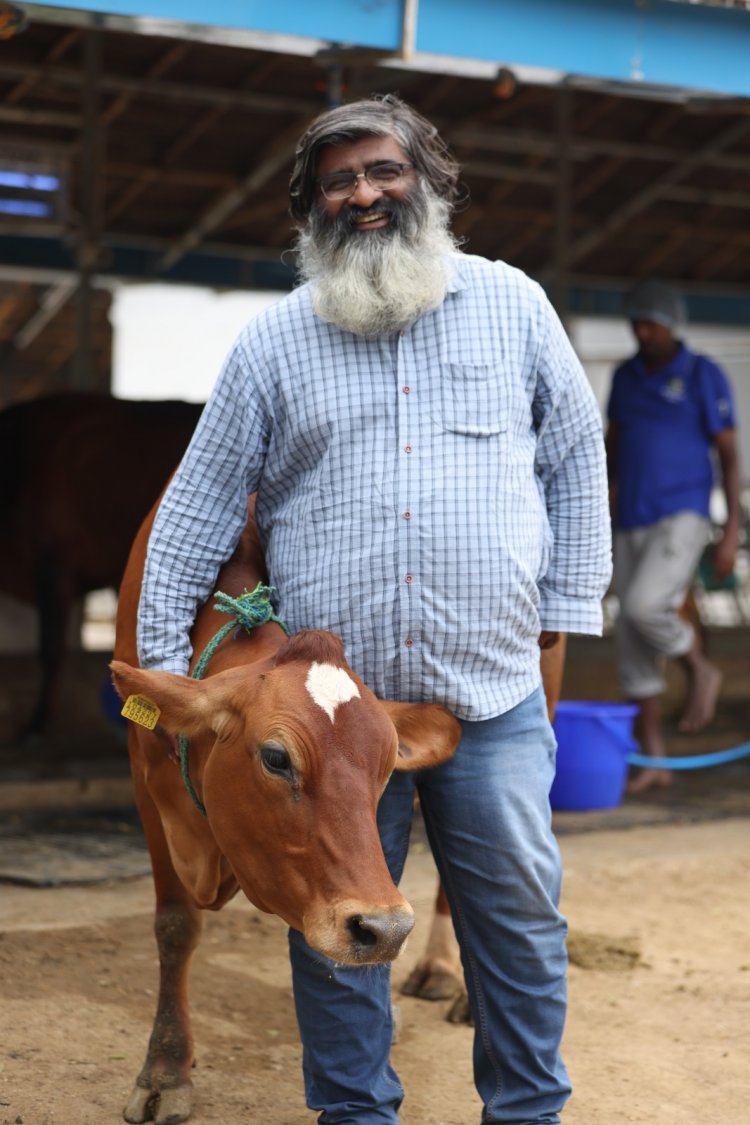
Why did you choose dairy for that?
We addressed two fundamental problems for farmers. The first issue was the need for regular cash flow, which dairy farming can solve by providing daily income. This steady stream of cash helps alleviate the uncertainty that many farmers face. The second issue was related to dung, which is often misunderstood. Dung needs to be value-added by mixing it with agricultural waste or other materials to create manure on a large scale. This manure is essential for rejuvenating the soil, which in turn ensures the farmer's income remains steady. Healthy soil is key to sustainable farming and regular income.
We began by establishing small dairy units, along with small backyard poultry units, and integrating practices like penning, bunding, and hedging, while also planting mulch crops in the hedges. These models were designed to be holistic and sustainable.
In 2011, we started with two farms. Each farm was owned by a farmer and typically spanned two to three acres. These farms were managed end-to-end by the farmers themselves, allowing them to fully integrate these practices into their operations. This approach has been the foundation of how we work to support small farmers and make agriculture viable for them again.
What are the places where you have established these clusters? How many farmers are involved in them?
The first cluster is located in Tiptur, in the Tumkur district of Karnataka. The second cluster was established in the Chengalpattu district of Tamil Nadu, and the third cluster is in the Gadwal district of Telangana. In the Tiptur cluster, we have around 1,200 farmers involved. The Chengalpattu cluster includes 80 farmers, and the Gadwal cluster has about 50 farmers. Together, these clusters cover approximately 4,000 acres of cultivated land. Currently, these farmers manage a total of 16,000 animals, and across all the farms, we collect about 1.2 lakh liters of milk per day.
Are these clusters confined to one or two villages, or are they spread over many villages?
The Tiptur cluster in Tumkur district is spread over a 10-kilometer radius around Tiptur. Similarly, the clusters in Chengalpattu and Gadwal are also spread over a 10-kilometer radius in their respective regions.
And where are you marketing your milk and milk products? You must be selling your products at a premium.
We are currently marketing our milk in three cities: Bangalore, Chennai, and Hyderabad. Our products are sold under the brand name Akshayakalpa. While milk is our main product, we also process it into other value-added products such as paneer, cheese, buttermilk, and curd. About 40% of our milk goes into these value-added products. We sell our milk at ₹85 per liter, which typically contains around 4% fat and 8.5% SNF (Solids-Not-Fat). Our ghee is priced at ₹1,500 per kg, paneer at around ₹800 per kg, curd at ₹150 per kg, and buttermilk at ₹30 for 200 grams.
Can you share the turnover and profit of your company?
Our turnover is around ₹30 crore per month. In the last financial year, it was ₹286 crore. As for profit, we're not making a lot of money, but we are breaking even in our operations. Bangalore is a very profitable market for us, while Chennai and Hyderabad are newer markets where we're still incurring some losses. It will take some time to establish those markets.
How do you ensure that the milk is certified organic?
The milk is certified organic by certifying bodies appointed by APEDA (Agricultural and Processed Food Products Export Development Authority). Additionally, 1,200 extension officers provide services to farmers to ensure compliance. The animal feed is entirely organic, sourced from organically grown cultivation.
What is the strength of the employees in your company?
Akshayakalpa is currently a 1,000-person organization. Out of this, 200 people work in extension outreach programs, which include 30 paramedics and 16 veterinarians. The remaining are development officers who collaborate with farmers to understand and address their problems.
What is the average number of animals that each farmer has?
Most farmers start with two to three animals, typically expanding their herd over a period of five to six years.
How do you ensure that no chemicals, non-organic feed, or antibiotics are used? What do you do if an animal gets sick?
When an animal gets sick and antibiotics must be used, the milk is segregated due to the exclusion period. Antibiotic testing is mandatory at the farm level. Since we provide veterinary and para-veterinary services, we know exactly which farms have administered antibiotics. We control the entire treatment process, and in worst-case scenarios, we ensure that milk from treated animals is properly segregated.
Where are your processing plants, and what is their capacity?
We have two processing plants: one in Tiptur, Tumkur district, with a capacity of 200,000 liters, and another in Neerpair, Chengalpattu, with a capacity of 40,000 liters.
Do you use bulk chillers?
No, we do not use bulk chillers. Each farm has an integrated chiller with a capacity ranging from 50 to 200 liters, depending on the farm size. Immediately after milking, the milk is chilled to 4°C, eliminating the need for collection centers. Each farmer operates their own chiller, and we pay them an additional ₹1.50 per liter for this service, allowing them to manage the chilling facility as entrepreneurs.
Do farmers need to invest in chillers?
Farmers do not need to make an upfront investment. The investment in the chillers is made by a leasing company or is split between the farmer and the leasing company. After three to five years, the asset is fully transferred to the farmer. This is how the leasing system currently operates.
At what price are you procuring milk from the farmers?
We pay farmers around ₹47 per liter, plus an additional ₹1.50 for chilling, which brings the total to approximately ₹48 to ₹50 per liter, depending on the fat and SNF content. Some farms earn even more due to better animal pedigree.
It’s a good price for farmers, but you’re selling the milk at ₹85 per liter. Don’t you think there’s a significant difference between what you pay the farmers and your selling price? Some cooperatives claim they transfer up to 80% of the consumer price to the farmer.
The claim that cooperatives transfer 80% of the consumer price to the farmer is not entirely accurate. They usually refer to the price of liquid milk but don't consider the average realization. In our case, the average realization for liquid milk is around ₹72 per liter. We sell skimmed milk at ₹60 and full-fat milk at ₹75, so there is a range.
Our farms are also producing eggs, poultry, fruits, vegetables, honey—all part of our integrated farming approach. It’s a complete farming solution for the farmers. Dairy is just one aspect of it. Over the last 14 years, we’ve focused on soil management, proper farm infrastructure, hedge crop placement, and effective rainwater harvesting. The average Akshayakalpa farmer now earns ₹100,000 a month. We’ve made significant changes in the farming ecosystem. We don’t work with thousands of farmers, but with a small group, creating substantial wealth in farming through improved productivity, soil management, and organic carbon enhancement.
We currently sell 8,000 eggs a day. At each farm, we’ve made it mandatory to integrate beekeeping, which also provides an additional 10 to 12 kilograms of honey every year. We’ve started growing greens and vegetables, which we now sell on our platform. Essentially, we’ve mitigated risk by diversifying the farms. There are now 300 role models in 15 years who have become examples in their villages on how to do farming.
What is the consumer profile? What kind of people are buying this product?
What we are observing is that, generally, parents are the primary buyers. They purchase conventional milk for themselves but opt for this product, organic milk, for their children. These are not typically high-net-worth individuals but are mostly middle-class and upper-middle-class families. They buy organic milk for their children while continuing to consume conventional milk themselves.
Is there an income profile for these buyers?
Generally, buyers fall into the ₹80,000 monthly salary range. They allocate a budget for milk that varies between ₹900 to ₹1,200 for a family of four. About 5% of our customers fall into that high-profile category. They purchase all their milk and dairy products directly from us. However, this is a very niche market, with the remaining 95% being typical middle-class and upper-middle-class families.
At what rate is the market growing for organic products like yours?
We have grown by 60% in the last five years and are currently the largest organic milk producer in the country. I believe the market has the potential to grow by around 30% year on year.
What growth are you expecting this financial year?
We are expecting to grow by around 30-35%. We aim to achieve sales of around ₹400 crores, up from ₹286 crores last year. We will also become a profitable company. In fact, we were already profitable last quarter.
Do you have some funding, and at what valuation?
Yes. In the first nine years, we couldn't raise money because we were focused on farming. But once we shifted our focus to the market in 2019, I raised ₹40 crores in capital. In 2022, we raised ₹117 crores from the British government and Zerodha's Nithin Kamath. Recently, in December 2023, we raised an additional ₹250 crores from A91 Partners. There’s a topline multiple of 1.75, so it’s a very brick-and-mortar valuation based on our sales multiple.
What is the promoters’ equity in the company?
It’s around 5%. I am the sole promoter, and I have diluted a lot over time. My friends, who invested from 2010 onwards until 2019, also hold around 25%.
Your current area of operation is in Tamil Nadu, Telangana, and Karnataka. Do you have any plans to expand?
Yes, we are looking into the Pune belt in Maharashtra, where we can address both the Mumbai and Pune markets.
Are you selling your products through a traditional retail chain system or using any other platform?
Right now, our biggest channel is the Akshayakalpa app in three cities. The app generates ₹18 crores of revenue monthly. People download the app, pay in advance, and subscribe, often paying 30 days in advance because we don’t have surplus, so they need to secure their orders. This is our primary channel. The second channel is e-commerce platforms like BigBasket, Blinkit, and Zomato, which contribute around ₹10 crores in revenue. We are a digital-first brand, and for the first time in India, a dairy company has gone digital-first. Generally, dairy is an offline market, but for us, everything is sold online, with only a small percentage, around 8-10%, coming from retail offline stores.



 Join the RuralVoice whatsapp group
Join the RuralVoice whatsapp group


















